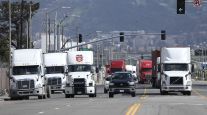Calif. Drought May Lower Demand for Produce Truckers by Summer
This story appears in the March 24 print edition of Transport Topics.
California’s severe drought already has hurt produce truckers, but the full brunt likely won’t be seen until fruit and vegetable moves peak in early summer, industry officials said.
“The drought has definitely had an impact,” said Oscar Gallegos, director of sales and marketing at Sierra Agricultural Transportation Inc. in Visalia, citing damage to citrus crops.
He also noted that pressure to find trucks could resume as early as next month when cherry harvests begin. Earlier this year, truck and trailer capacity was squeezed in California because equipment was out of position and unavailable.
“We will see a lot of product bunching up” later this year, Gallegos said. “There will be a desperate need for over-the-road trucks in the first part of July.
“California has been kind of a soft market,” said Mark Montague, manager of industry pricing for load board operator DAT, based in Portland, Ore. “This time of year, activity generally is slower. We attribute a lot of this to the drought.”
Montague said one measure of weakness is a lower level of refrigerated shipments, which declined 14% statewide during a seven-day period in early March. The declines exceeded 40% in some areas, DAT said.
“It’s too early to know where we stand” on produce and trucking shipments,” said Dave Kranz, a spokesman for the California Farm Bureau Federation in Sacramento.
“There are a number of reasons why it’s difficult to predict,” he said, because more precipitation could help farmers who have delayed planting until the last possible date. That’s two weeks or more away for some crops, he added.
“Obviously, we are very dependent on winter rain and snow to carry crops through summer and fall,” Kranz told Transport Topics, noting that precipitation levels so far this year are about one-third of the amount received during the last severe drought in 1977.
The result, according to a Bloomberg Industries report, has been damage to crops such as lettuce, tomatoes and broccoli.
Last week, news services reported that California officials eased some water restrictions, including the San Joaquin Valley, one of the nation’s largest sources of produce. The reconsideration prompted by recent rain and snow storms followed lobbying from growers and lawmakers who envisioned severe harm to the state’s economy.
“California’s agriculture is critical to the world’s food supply,” Assemblywoman Kristin Olsen, who represents part of the San Joaquin Valley, told the Reuters news agency. “An inability to produce that food would clearly be devastating to health and human safety not only in California but around the globe.”
Nora Trueblood, a spokeswoman for produce broker Allen Lund Co. echoed Kranz’s view.
“It is too early to know how the growing season is going to play out, given the season is only just now starting up,” she said in a message to TT. “Check back with us in late April, early May when we will have a better handle on the effects of the drought on California growers.”
Allen Lund is No. 21 on the list of 25 largest freight brokerage companies included in the Transport Topics Top 50 Logistics Companies in the United States, Canada and Mexico.
There is a chance, however, that trucking may get some benefit from the drought.
Earlier this month, the U.S. Fish and Wildlife Service said a lack of water for tens of millions of young salmon might require trucking them more than 150 miles to San Pablo Bay from their normal habitat on the Sacramento River.
Like others, he believes there will be “ripple effects on the economy” as smaller crops could lead to fewer trucking shipments and higher prices.
The drought’s effects aren’t uniform, Kranz also noted.
Some regions, such as the southern San Joaquin Valley, are better off in terms of moisture than areas farther north in the state. In addition, he said about 500,000 acres, or 6% of irrigated land, won’t be planted this year, a fact that eases the pressure.
Montague also noted the effects of the drought aren’t uniform.
For example, he said, harvests and shipments of strawberries are doing well, because that fruit does well in dry conditions.
DAT noted that the drop-off in California has been accompanied by more produce moving elsewhere, such as McAllen, Texas. Shipments there from the Rio Grande Valley and Mexico rose 10% over the same period.




